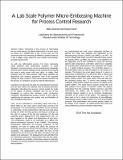| dc.description.abstract | Micro embossing is the process of fabricating micron-sized features by plastic deformation of a work piece by means of a shaped tool or die. In our work we are concerned with hot embossing of PMMA to produce features in the 1-100 µm range, suited for micro fluidic and photonic product requirements.
As with any deformation process, hot micro embossing yields products with dimensional variation. In ideal situations, several products can be manufactured repeatedly with the same machine settings and be expected to be exactly the same in every aspect with each other. In reality, final products from the same process might have variations in dimensions and material properties even if the machine settings are kept constant. These can be natural variations of the process or variations caused by external disturbances.
Variations can decrease the yield of a manufacturing process and can also restrict the ultimate level of product precision attainable. Manufacturing process control entails the study of the origins of process variations and the use of this knowledge to reduce this variation under production conditions. Manufacturing process control is thus vital in establishing the ultimate cost, quality, rate and flexibility of any manufacturing process.
Thus, we are interested in controlling inputs that have a direct effect on the work piece’s final shape and thus the productivity. For hot embossing of PMMA, we are interested in controlling: (1) the temperature of the die and work piece during the entire forming process (forming & cooling), (2) the rate of cooling of the die and substrate, (3) die and substrate platen displacement and displacement rate, (4) force applied on the platen and distribution of this force. The temperature needs to be controlled as it affects the thermo-mechanical behavior of the PMMA. The forming temperature determines the forming properties of the material, the rate of cooling will affect the amount of shrinkage and thermal stresses that the polymer work piece undergoes. The displacement will affect the flow of the material into the die and this will affect the feature size and depths to be embossed. The displacement rate will affect the non-Newtonian polymeric material flow rate into the cavity. It is imperative to carefully control those inputs to minimize variations in forming behavior and final product dimension and properties.
An experimental lab scale micro embossing machine to address the needs was designed and fabricated at the Manufacturing Process Control Lab (MPCL) at MIT. An Instron Model 5869 Table mounted materials testing system of capacity 50KN (11250lb) was chosen as the platform for the apparatus and it was modified to accept the forming platens with temperature controllers which have capability of controlling the temperatures of the substrate and master to +/- 1 degree Celsius accuracy. The controller powers 2 x 200 watt heaters that can heat the platens to 150 Celsius in 8 minutes. The Instron has a test speed range of 1 micron to 500mm/min (0.00004in/min to 20in/min) with a 50KN load cell attached to the platen with an accuracy of +/- 1N. The platen cooling system uses water where flow rate will vary the resulting cooling rate. To ensure even heating of the substrate, shape factor analysis was used in the design of the copper platens. The shape factor analysis reveals the heat flow patterns and regions of isotherm within the platens originating from the cartridge heaters and thus using this information, the platens can be designed to have the cartridge heaters located so as to minimize temperature variation of the surface of the platen. The apparatus has been used so far to study hot embossing of sub-millimeter sized features using a copper master on a 1mm thick PMMA material. This presentation will provide greater details on the design of the machine, its initial performance tests and some preliminary process variation experiments. | en |
